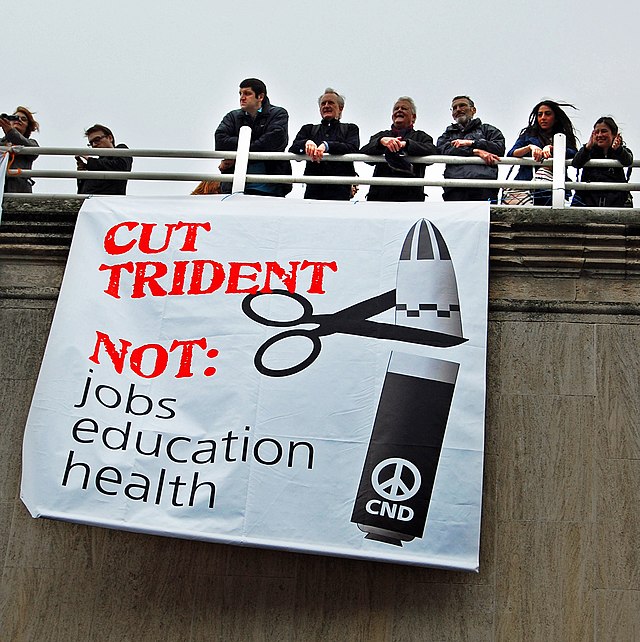There are questions coming from all corners regarding the documented dependency of the UK’s nuclear weapons on the US.
Take a look below at the comments on a recent article in the UK Journal of Defence. It seems that increasingly wider audiences are coming to terms with something that the disarmament movement has been arguing for years – that the UK’s nuclear weapons programme is strictly dependent on US assent.
This is because the missiles launched from the UK’s nuclear submarines are provided and maintained by the US. The submarines regularly visit a US military port in Georgia to have these missiles serviced and loaded onboard.


This is no secret and is not even contested by the UK government. Commitment to maintaining these weapons therefore compromises the UK’s sovereignty – if Trump or any US president were displeased with British policy, they could undermine the UK’s Trident nuclear weapons programme with the stroke of a pen.
It is no surprise, therefore, that we are seeing attempts by establishment media to legitimise and justify the absurdity of Trident.
A recent poll on Scots’ attitudes towards Trident was commissioned by ‘Scotland in Union’ (a campaign committed to fighting “tooth and nail against attempts to force a second independence referendum on Scotland”). The results apparently showed majority support amongst Scots for nuclear weapons, and The Scotsman reported these results as proof that the SNP’s long-standing policy of opposing Trident stands at odds with the public.
But the slightest scrutiny of the poll’s methodology reveals both distortion and bias in the question posed to respondents. Just look below at what this poll asked 1000 Scots:

This is a fantastic case study in flawed polling methodology, and especially how to mislead respondents with carefully curated questions, or in this case straightforward misinformation.
Firstly, as already explained, the UK’s nuclear weapons are not independent. Pretending to participants that it is would undoubtedly affect their responses. How many of the 1000 Scots polled here should we expect to understand the full extent of Trident’s dependence on Trump in Washington?
Secondly, describing Trident as a “deterrent” is a propaganda term in itself, which obscures the fact that these are weapons of mass destruction designed to enact genocide and with the capacity to destroy the entire northern hemisphere. The term also casts the weapons as passive and neglects that they pose huge risks of catastrophic accident, cause active harm through radioactive leaks into the Clyde and put a target on the backs of Scots. Moreover, the mere possession of such weapons escalates geopolitical tensions. Every time the term “deterrence” is used by a country to justify possessing nuclear weapons, their value is emphasised to states that aspire to possess them, like Iran and Saudi Arabia. And as more countries possess nuclear weapons, the danger of nuclear conflict escalates exponentially.

“Deterrence” is the central conceit of the nuclear weapons mythology. This mythology is not even believed by the UK government and defence establishment, since if Trident were an effective ‘deterrent’ why would we need to cut welfare in order to boost conventional military spending?
The very notion of “deterrence” is a misnomer about what nuclear weapons are for. They are not designed to deter but to project dominance and provide impunity for geopolitical aggression – that is how they operate for Russia, Israel, the US, the UK and all nuclear states.
That is why we must build and sustain the movement opposing these apocalyptic weapons, and construct a vision of a fair and equitable society without them. Scrapping the Trident renewal programme would free up hundreds of billions of pounds over coming decades. These resources could totally revitalise our social services and infrastructure, and underpin a robust plan for growth which the UK government has utterly failed to provide.
Thanks, as ever, for the commitment and support of our members in fighting to build an alternative future for Scotland, not defined by the scourge of nuclear militarism.
In peace,
Scottish Campaign for Nuclear Disarmament
